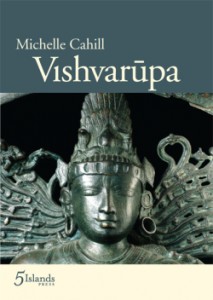 Vishvarūpa by Michelle Cahill
Vishvarūpa by Michelle Cahill
Five Islands Press, 2011
Michelle Cahill’s second collection is marvellously named Vishvarūpa, Sanskrit for “manifold, having all forms and colours”. The cover is classic black and silver, with a close-up photograph of a Hindu deity’s sculpture. If the package says anything, it’s intelligent. And the package does not lie. Cahill may laze in the splendour of nature or love, as is the way with so many poets, but she does so with extensive layering. In varying odes and confessions she incessantly challenges her multi-cultural identity through an inability to both grasp and contain language. With an overload of foreign words in any given poem, Cahill presents her readers with the difficulty of language and its translation.
Our frustration with reading the poem ‘Deva Loka’, for instance, and navigating our way around terms such as dhoop, mukti, n¬āmarūpta, tribhanga, sal, bhojpatra, gopis and chanda, enhances Cahill’s themes of inquiry with language and communication, and bewilderment. In Vishvarūpa language is lost as soon as it is spoken. In ‘Ode to Mumbai’, language is analysed in a determined, almost angry manner – “Piece by piece I’ll remove your unwieldy syntax” – and in ‘Nasreen’:
We talk in a nervous patois of English-Hindi,
in a voice that retreats from its subject beforeit can ever be defined.
These citations are from Cahill’s Indian poems, where language is mysterious and sexy, a contemplative obsession to the lone traveller. At the other end of the spectrum, though in complete concordance, are her Australian poems, where the poet is in a familiar English-speaking space, such as Sydney’s Luna Park. Here language becomes an urgent passion: “Words come / to me as freely as a sparrow falls, unfastened by the sky”.
Oddly enough we are witness to this urgency again in one of Cahill’s random Spanish poems: “a clamour in my throat, a small emergency of words” in ‘Amante de lo Ajenjo’. Even though the narrator feels a rush of desire for connection through language, she is out of her depth as a native English speaker. The four excerpts represented here show that language is clearly complicated and crucial and, even when lost in translation, communication will endure. In one of my favourite poems, ‘The Stinking Mantra’, even wisteria speaks in clear vowels, imploring us to recognise that no one and nothing is immune to language.
With language and translation comes place and, in contrast to the Reuters journalist ‘who is charming, who thinks this is all a joke’ (in ‘Prayerflags from Dharamsala’), place is personal, incomprehensible, however encompassing. In a single poem Cahill paints us a new world, her world, though she might insist that she has no claim on it. It is a world in which the ordinary life is illuminated by dreams and myth. The boundaries between real and imagined aren’t blurred, but rather ebb and flow into one another, altering straight lines into curvy ones – into luscious, moist, curvy lines. The voice is unflinchingly rich and intuitively sensual. In another quote from ‘Ode to Mumbai’, I believe Cahill says it superbly: “my bed is a temple and a brothel, where dream defines me”.
It is striking how many times Cahill acquaints us with the words phallus, penis and cock, securing us in the overture that it is a male’s world, even in an androgynous one such as that of Hindu gods and goddesses. Yet it is the scent of the female, the voice of the female that takes charge. And so we have a view of the wild and varied world as mythical, dreamy, sensual and female. This is truly poetry at its finest.
In Vishvarūpa we see the poet’s panoramic vision. Cahill sees everything, from flowers to shadows to “the iris of the spotted hawk”. Detail abounds, but it is never overpowering. One description flows into the next organically and yet, as sentence length varies and commas are used unsparingly, there is still a sense of surprise. ‘The Chase’ begins in this way:
Yesterday’s clouds leavened the autumn sky as we walked
along the muddy trail by the creek, to where the rains flowed,
spilling over the scent of soil, the secrets of moss-covered stones.
The poem continues in vivid tercets on a graceful canvas of visual and narrative opulence. It’s intoxicating. This is a skilled poet who has such a keen eye and a deft sense of rhythm that we are more than willing to follow her wherever she will lead.
This is, however, a moody collection. There’s a sense of loneliness in this crowded and speckled world which lends to serious overtones. I think that is why I found any slang or reference to pop culture invasive to my own mood. Phrases like, “I spin right round, like a record” (‘Durga: a Self Portrait’) jerked me away from the sultry atmosphere I was so enjoying and forced me to sing 80s music, picture one-hit-wonder bands with bad hair. I felt allusions to Judge Judy to be out of place, as I did with the substitution of ‘kids’ for ‘children’. I just didn’t feel there was a place for this sort of playfulness.
Luckily these instances are very few and far between and, for the most part, when Cahill melds myth with reality, the timeless with the present, she is doing so in a very satisfactory and grounding way. She allows us to come down from the sky, crawl out of her dream and come back from the past through the mentions of mobile phones, cigarettes, playing with her daughter, and she reminds us that exotic worlds can and do exist right beside places like Woolloomooloo. This is a collection which encourages a reimagining of one’s own world and a redefining of one’s connection to it. A stunning and engaging collection.













